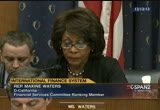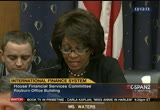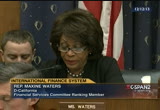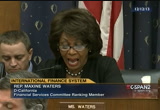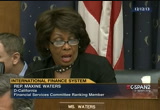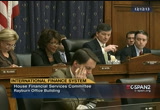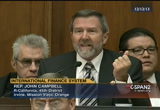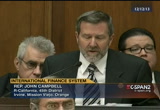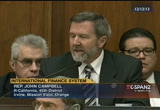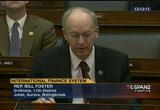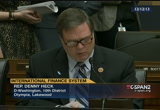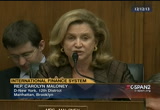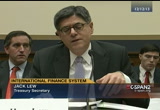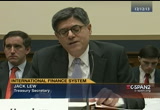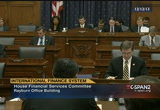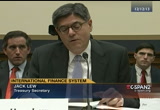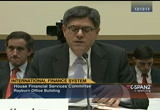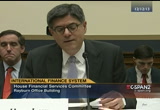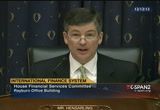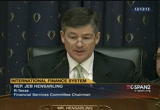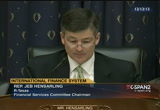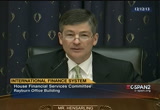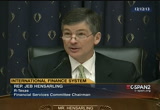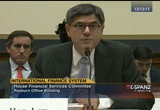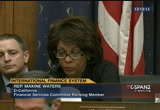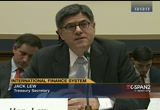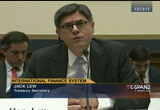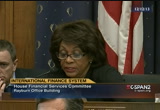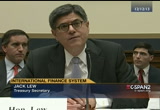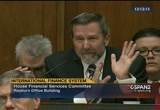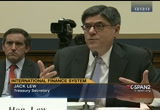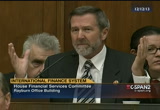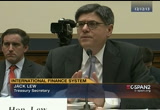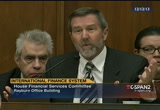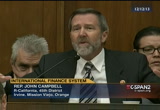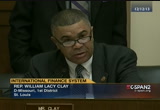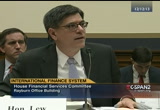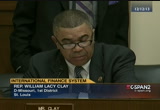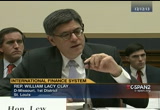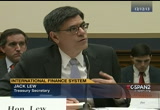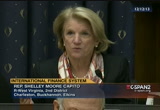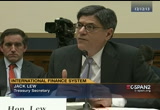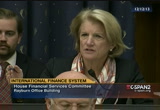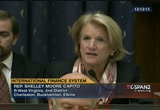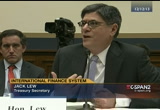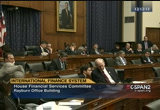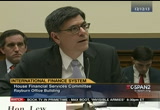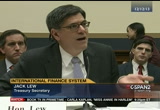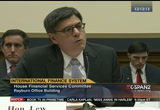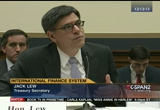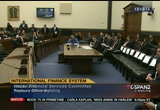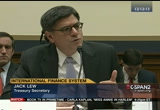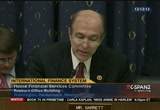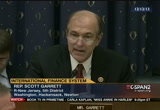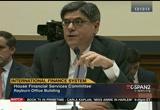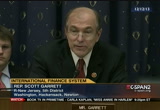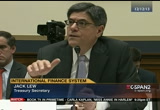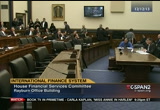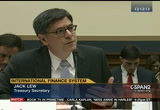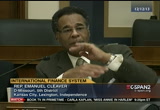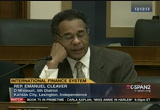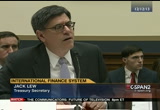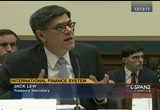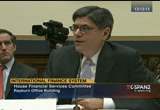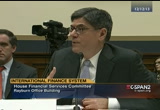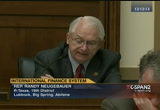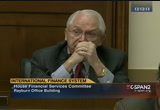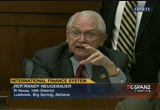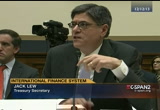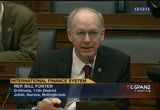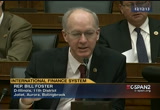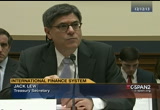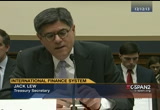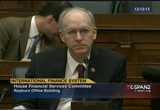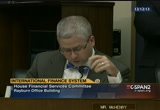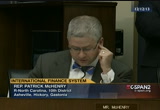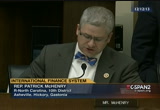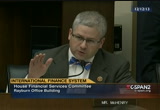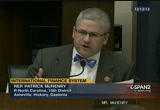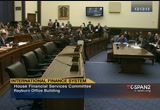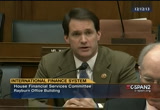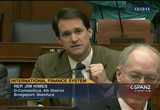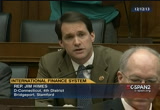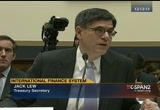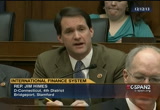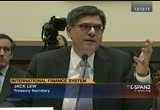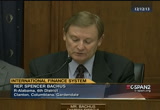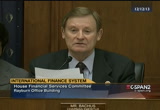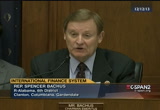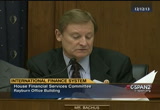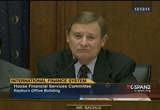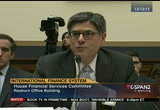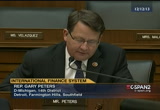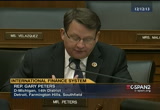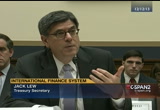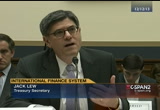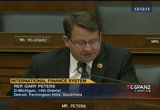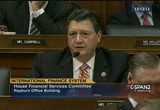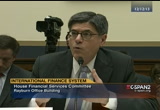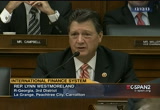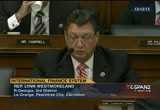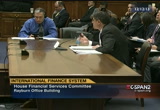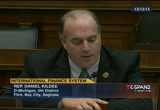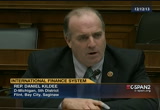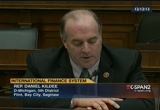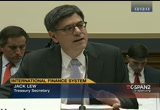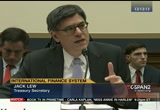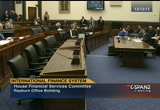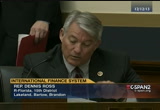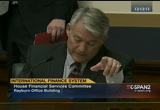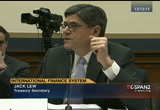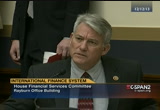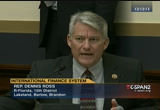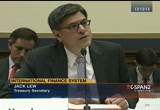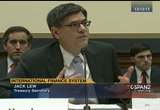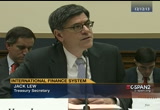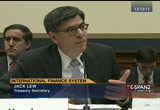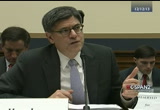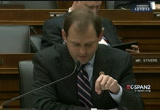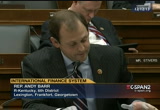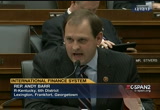tv Key Capitol Hill Hearings CSPAN December 23, 2013 4:00pm-6:01pm EST
4:00 pm
economies have also experienced rising income inequality, the most shocking are right here in the united states, the highest level of inequality of any of dance industrial nation. in fact, today 20% of income in our country goes to the top 1% of america. if you look at inequality of wealth it's even worse. the top 1% holds about 40% of the country's wealth. the gap between the rich and poor in america. moreover, the gains from growth during the recent recovery have accrued overwhelmingly to the wealthiest people in society. almost 95% of the income gains since the recovery began have been captured by the top 1%. this means the most unequal advanced industrial economy in the world is becoming even more so. some degree of inequality is
4:01 pm
necessary for the function because it creates incentives to work hard and take risks. left entirely to his own, the market system will produce more inequality in this economically necessary. here in our country, we have much more inequality than is necessary for efficiency. i believe this is a moral problem from the standpoint of social equity. but excessive inequality not only undermines social and political cohesion, it is also recently been shown to have negative effects on growth and stability as well. recent research at the imf has shown that excessive inequality slows growth, costa price-to-earnings gemelli to weaker demand and lower section. reducing inequality is increasingly understood to contribute to economic growth. inequality is also a political problem.
4:02 pm
we now have an increasing degree of resistance on the part of many americans to new trade agreements because they see themselves as the dems of globalization resident as participants benefit. i believe our international economy policy has been too one-sided, to focus on elevating the interest in mobility of capital over all other considerations. this is based on a misguided leaf that unfettered markets would not only create wealth and stability, but would also trigger benefits out to others in society. this is that what happening. in fact one of the most important lessons we've learned from the recent financial crisis as markets must be deeply embedded in systems of governance. the idea that markets are efficient and self-correcting has received a martyr blow. i believe in capitalism and the markets of the main engines of wealth creation in our country and elsewhere. in order to be truly support
4:03 pm
about the free market i believe you must also be supportive of government. this is because we need to have an appropriate sense of public policies in place to rein in the excesses of the market to help maintain stability and to ensure the benefits of capitalism and growth are broadly shared. but it sure got start dealing with equity. for example, we should be increasing the minimum wage. extended unemployment insurance and providing trade adjustments and other systems. those in the u.s. on the low skilled and who are disadvantaged by globalization. until we do that people begin to feel secure homes will not have the support we need from our active engagement by the united states for the international economy. mr. chairman, i thank you for holding this hearing today. some of what i've alluded to in my statement are issues that are
4:04 pm
being dealt with as we consider the budget today. these issues i've alluded to include of course the unemployment benefit than i understand may not be in the budget agreement. also, i believe that providing trade adjustment and other assistance for those that i appointed to that in the low skilled and are issues that we have not sufficiently dealt with and i'm looking forward to engaging you and others on this issue so we can get at how we will deal with this income inequality that is the central team of my testimony today. i yield back the balance of my time. >> the general idiots that are the chair now recognizes the gentleman from california mr. campbell, chairman of monetary policy and trade
4:05 pm
subcommittee for three minutes. >> thank you, mr. chairman. welcome, secretary lu. international financial institutions act. there's no shortage of international financial issues we can discuss. i'll let my written opening standpoint stands for itself. wanting to be discussing that when you talk about it i am not here as as a reminder too that the nine congress authorized $100 billion to the imf in an account called arrangements. now there is discussion of transferring 63 billion of that into permanent paid in capital. there's a lot of concern about this, secretary lew. a number of concerns appear about this. we don't believe this is a bookkeeping entry. this was $63 billion significant analyst, were currently it is
4:06 pm
not. second and third budget cuts there's a lot of concern whether what we are cutting a lot of domestic issues as the ranking member just mentioned, this is a time when we should be increasing funding to first world countries around the world. there is some concern whether a lot of this money could go to european countries and yet they have some crises and problems but can't figure what the singer without taxpayers be involved. there's concern about oaxaca is good with the imf making more loans to indebted to be encouraging that kind of indebtedness. rather than trying to encourage these countries to get out of their debt and not to spend so much you borrow so much. finally, dairy farms involved with the imac with additional contributions. a lot of concern about whether reforms are enough, whether they go far enough to change the government says it should be.
4:07 pm
mr. secretary, if the administration, a few if the president are committed to and want to $63 transferred, we need a couple of things. we need three things actually. we need first to value to make a formal request, which is not received by this committee for this monday. secondly, we need to address these issues. we need the president. if this is a priority for $63 billion of u.s. taxpayer money, we need here mr. secretary and the president to vocally articulate why this is a priority in this era of limited budget and why these concerns that people have on this committee are not well-founded here thank you. look forward to your testimony. i yield back mr. chairman. >> the chair now recognizes the gentleman from illinois, mr. foster for one minute.
4:08 pm
>> thank you, mr. chairman. thank you, secretary lew for joining us. when you left your first tour of duty in the white house in 2001, we are paying down our debt to the chin of a couple hundred billion dollars a year contract to pay her debt down to zero by roughly 2008. in the next eight years we saw a surplus for running reverse in a structural deficit exceeding $1 trillion a year over the next eight years. were also sitting on eight straight years of uninterrupted job growth. roughly 22 million jobs in eight years. we saw in eight years following her first departure zero net job growth or 20 million people enter the job market with zero jobs produced by them. we've made significant progress since entering the worst recession since the great depression. receiving 45 straight months of consecutive private sector job growth and there's much work left to be done and i thank you
4:09 pm
for preparing today. >> the gentleman yield back. the chair recognizes gentleman from washington, mr. hack for one minute. >> thank you, mr. chairman. secretary lew thank you for appearing today. are here and i am interested in is actually taken place figure treasury department has he speak. the bank secrecy act advisory group is meeting right now and it is confronting the question of how to allow legal marijuana businesses to access the banking system. as you know the voters in my seat in colorado last year approved initiatives to make marijuana legal for adults. these policies go into effect in the new year but we need cooperation from the federal government to make it work. if federal banking regulations continue to prohibit marijuana businesses from using the banking system, the saw cash
4:10 pm
businesses will be a magnet for robberies organized crime. you have the power to prevent that, secretary lew. i hope the advisory group is a new workable titans today and i hope you swiftly approve it. >> the time of the gentleman has expired. the chair recognizes gemology from new york, ms. maloney for 30 seconds. >> is my pleasure to welcome secretary lew from the great state of new york are new yorkers are proud of your public service. my question concerns gst refund. you mention in your testimony or growing economy and that your main job is to create jobs. many economists have testified one of the most important things we could do is bring certainty to housing finance. i hope your comment on the efforts of the administration to support housing finance reform and certainty in that area. welcome i look forward to your
4:11 pm
testimony. >> directionality has expired. we welcome the testimony of the honorable jack lew secretary treasurer of the united states. secretary lew appeared before a committee earlier this year. i believe he needs no further introduction. without objection, secretary lew's written statement will be made part of the record. after his oral remarks, again welcome to the committee. you're now recognized for oral testimony. >> thank you, mr. chairman.% testimony. >> thank you, mr. chairman. ranking member waters member subcommittee appreciate the opportunities testify today. thank you for the flexibility for scheduling through a number of us could attend memorial services for nelson mandela. there are signs the conditions improving in advanced countries led by the united states. despite political headwinds come our economy is growing. over the past 45 minutes businesses created more than a billion jobs. while moving in the right direction, we have more to do to
4:12 pm
create jobs to not put our economy and a firmer foundation. astronaut, economic progress is part of the global economy and the global economy continues to face many challenges. a long recession in the euro area seem to be ending. significant progress is achieving financial stability. europe is a positioned to boost demand employment which is high in many countries. japan can authorities have taken forceful actions to begin ending deflation. to achieve sustained success japan is to undertake structural reforms to strengthen domestic. reselling emerging-market sodas post crazy stimulus waned. emerging markets need to make reforms that increase resilience and address structural constraints to growth. canister leadership recently announced bold commitments to reform. the character of reforms will shape china's economic transition or domestic consumption led growth in a way
4:13 pm
for resource intensive growth. an important part of my job is to work to create the most favorable external environment for u.s. jobs and businesses. the international financial institution from international monetary fund multilateral banks are indispensable in a sufferer. we must preserve our leadership in these institutions. that's why it's so important congress act to approve the government's reform. at the g20 2010 we preserve the veto without increasing the u.s. financial commitment to the imf. right now u.s. approval is the only remaining step needed for these important reforms to go into effect. if we fail to act them or risk a loss of influence at the imf. to implement the quota reforms the administration has provided draft legislation to reduce u.s. participation in the arrangements to borrow and simultaneously increase the size
4:14 pm
of the u.s. quota in the imf by an equal amount. our investment in the imf is safe and sound. it does so subject to appropriate conditions and this repayment record is outstanding. investments of multilateral banks also provide substantial returns that institutions leverage limited contribution from multiplying impact by attracting contributions from other nations. they also effectively promote our national security and economic priority, including opening up markets in the ring bearers for u.s. businesses abroad. his important to know the u.s. will make a commitment to the international development association of the world bank and african development fund this year. these are the two largest sources of finance for the world's poorest country. their impact is enormous. assuming 10 commitments to the international financial institution, is crucial to continue to strengthen the world's financial system. the united states has led the
4:15 pm
global effort on international regulatory reform with many core reforms largely completed at home. on tuesday double core will come a centerpiece of reforms is finalized. the rule is strong and comprehensive and will change behavior practiced across our financial system to safeguard taxpayers are created by banks, proprietary trading and hedge fund and private equity fund. it also fulfills the president's vision by sending tough but workable restrictions are continuing to allow banks that markets function. eskimo for the international agenda in 2014, we will work with the g20 for the financial stability board to promote implementation of high-quality regulation. we focus on advancing vigorous implementation of ensuring assets are consistent across borders and the high-quality capital standards not.
4:16 pm
will also focus on strengthening arrangements are in cross-border resolution of large complex financial institutions. swift implementation of convergent requirements over the counter derivatives market and develop a roadmap to address risks posed by shadow banking. it us up at the forefront of efforts to use financial measures to be its key national security and foreign policy goals. nowhere have efforts by mark concentrated in easing sanctions to pressure -- to advance our policy and prevent iran from obtaining a nuclear weapon. together with our international partners and close ordination of congress come with both of us effective sanctions regime in history. even as we explore the possibility of a long-term agreement with the ram that can provide verifiable assurance that her man cannot obtain a nuclear weapon we will continue to bursar sanctions vigorously other action this morning imposing sanctions on more than a dozen entities demonstrates.
4:17 pm
chairman has a link in the ranking member waters, members of the committee come across the global landscape is much work ahead. with ongoing support and confident we'll continue to protect americans that all interests abroad and at home. thank you amount for it to questions. >> thank you, mr. secretary. the chair yields and saw five minutes for purposes of questioning. the secretary as omb director in february of 11. you're quoted as saying it's an accurate statement that our current spending will not be increasing the debt. we stopped spending money we don't have. you said that while introducing the president have i told budget, which according to cbo added 12.5 trying to the gross national debt over a 10 year budget window. under your watch 1.4 trillion was added to the gross national debt. i'm trying to get some insight
4:18 pm
into the administration's view of our national debt. do you still can buy those comments? is there some context or are those comments? >> mr. chairman, at the time i was trying to explain the difference between a primary ballots, primary surplus and spending. it's been a common new commitments being made. the definition of primary balances when the only deficits related to pain interest on the national debt. other than that we're covering all of her expenses. >> let me then to find to a statement the president made fairly recently about six weeks ago. don't pretend as if america's went bankrupt at a time when deficit has been cut in half. isn't it true, mr. secretary and these deficits have only been cut relative to the largest deficit in our nation's history as a world war ii? >> mr. chairman, if you look at
4:19 pm
the reduction in the deficit since 2009, we seem the most rapid reduction in the deficit as a percentage of gdp. >> weren't these the largest deficits in our nations history? >> we did come in at a time when we inherited a large deficit. we're in a financial crisis. >> mr. secretary, if you are unaware i would have your aides take a look into it. i think you'd find that probably is true. also come to cbo released their latest long-term outlook. have you had a chance to look at it? it came out also roughly about six weeks ago. >> unaware of it. under current our current policy, and a science, deficits come in temporarily until 2015 and rites thereafter with no end in sight. is not true, mr. secretary? >> mr. chairman, i came prepared to discuss a wide range of issues. i can speak generally about this
4:20 pm
issue. i'd be happy to. >> isn' i can speak generally about this issue. i'd be happy to. >> isn't it true the administration has never submitted a budget that balances in five years, tenors 50 years or anytime? >> mr. chairman, the administration submitted budgets that was out of control about it under control. the cheaper progress reducing the deficit. >> has the administration never submitted a budget that balances over anytime? >> i don't believe the measure have an effect right now -- >> i get to ask the questions. so if you don't know -- >> i do know. there was supported in the far distant future. >> not according to the congressional budget office. according to his analysis? the treasury analysis, omb? 's analysis? >> mr. chairman, i'm happy to look at the projections of the
4:21 pm
budget. >> let me if i could come anytime i have remaining, move onto the deck dealing. as you know, every major deficit reduction package of a generation has an attached to a dead dealing. even in today's budget control act. every president in your lifetime and my lifetime has negotiated money to dealing that are capable staff researched the issue. the debt ceiling tends to be the early warning system that spending is out of control. yet on september 15 at this year the president the unprecedented and radical action of stating i will not negotiate on the debt ceiling. so is it the position of this administration that if congress does not functionally repeal the debt ceiling and allow them that
4:22 pm
he is wrecking our debt? >> the debt ceiling is at the very end. as it's making today all the decisions congress made on entitlement program and tax policies determine suspending -- >> my time is almost up. are you aware that any other president in our lifetime who has taken a radical position that he will not negotiate the debt ceiling. >> i think we learned in 2011. we learned again that treating the debt limit the way congress did put our economy in grave danger. every president in my lifetime has said the same thing. is imperative to raise the debt ceiling. >> the time of the chairman has expired. i would also say every president in our lifetime has negotiated on the debt ceiling.
4:23 pm
the chair now recognizes the ranking member for five minutes. >> thank you very much mr. chairman. i would like to see if i can get a clearer understanding about where we are in relationship to finance discussions in trade talks with europe. i sent a letter to i think you and the president basically stating my position on whether or not we would need including financial services provisions any trade agreement. i indicated it may undermanned rotter at first in the u.s. and elsewhere to cross broader oversight. i noticed in "the wall street journal" reporter, indicated that u.s. treasury secretary
4:24 pm
jacob lew pour cold water on a push by the european union's top financial markets regulator to include negotiations of our financial services regulation and eat you -- do you -- that talks about the possibility we are softening our position. i would like some clarification from you today about where we are in those discussions. >> congressman waters i think the issues of working on an international basis to make sure that we have a race to the top to the highest standards possible in terms of financial stability, it is very important we work actively through the g20 in the financial stability board, the fsb to try and drive that process. i am actually at the police and prod the united states that we've taken decisive action, the most decisive action of any country in the world, after the
4:25 pm
deep recession and economic crises of 2008-2009. i've said many times i do not believe trade agreements are an appropriate place for us to dilute the impact of the steps we've taken to safeguard the u.s. economy and i think we should make a call to the world community and the appropriate form like the g20 or the fsb to try and drive that race to the top. i've said that in public. i've said it in private conversations with the europeans. obviously, trade agreement is important. it would open opportunities for u.s. economic growth in european economic growth. europe's core economy is important to us and keeping outline of trade open is important to us. i look forward to making progress in the trade negotiations and i look forward to having progress in terms of opening up access to financial markets were even more u.s.
4:26 pm
competition and more u.s. investments. >> i would like to try and understand how much pressure are you receiving to introduce financial regulatory issues into these negotiations? >> the issue has come up for the entire time that i've been secretary, since february, march. it has been an issue that europeans have race. i responded as adjusted in response to your question. i made some pretty public remarks last week, where i called on our international partners to work through the g20 and the fsb to tighten standards. i've tried to be very clear in what our policy is. >> are you -- of course you are aware and understand efforts are underway to do with cross-border regulations including the g20 and the financial stability board. so our concerns and some of the criticisms from other lawmakers
4:27 pm
are that other administration trade initiatives would effectively sidetrack domestic regulation in favor of international laws. some of our members are saying that they fear the ambitious transpacific editorship could create rules affecting technology development with u.s. domestic regulation. >> congresswomen come on the financial issues i'm quite familiar with it. on technology issues, that is an issue the u.s. trade representative would be more appropriate to address. on the financial issues, i've been clear in every conversation that i've had that we are going to in the text agreement, promote opening markets for u.s. access, having standards consistent with iran. i have been very clear that
4:28 pm
watering down in any way u.s. regulatory standards is not appropriate in trade agreements in terms of project in our financial markets, our financial system and our economy. you know, i think separately we have to discuss what does it mean to harmonize across international boundaries? i think we've seen very constructive development seen the derivatives area where we take an initial action. the international community responded. there's now a reconciliation so we can have a world community reached the u.s. high standard. we may sometimes have to go back in may conforming changes for that to work. >> the time of the gentlelady has expired. the chair now recognizes the gentleman from california, mr. campbell, chairman of anna terry jay committee for five minutes. >> thank you, mr. chairman. let me jog back to the imf for a minute. i know that an e-mail from a staff member with languages not constitute a formal request. if congress is to consider the
4:29 pm
imf money we need a formal request for new according to the law. i don't want to get into too much minutia on that. one thing is for this thing costs. would you agree that if you move 63 billion into capital that it is not without risk? a >> congressman, if you look at the history of the imf it supports very little risk. >> okay, but it's not zero. >> i believe it is awfully close to zero. >> should we have to cbo tell us what they think like >> if i could go back congressman, the question of request is tied to the fact we've been trying to be flexible in responding to what we've heard from congress. in our budget last year we propose this as something dennison authorization, a mandatory provision. we heard back from congress there was an appropriations matter. we responded and provided
4:30 pm
language to do with it as as an appropriations matter. >> authorizing committees like this don't like things that go direct to appropriations without the people who are actually -- >> we can do it either way. >> with assertive and a bipartisan basis ugly prefer it done that way. -- is the president supported by this transfer? ..
4:31 pm
that they will hear. why is that any different than trying to harmonize the financial regulations as best we can through a trade agreement particularly given how the borders and the financial matters have dropped so much. >> when you look at the progress we have made since 2009, the g20 has been quite effective places to work for a very complex technical financial regulatory matters. i don't think the trade context is the ideal place for that to be done. the people that the table are not necessarily the right people and the mechanisms already exist in the g20 regardless of where
4:32 pm
we do it as the core issue. when we enter into a trade agreement -- >> november 27 the -- >> i don't remember the date. >> what was the outcome of that meeting? >> i think as we acknowledged with congresswoman waters we discussed this a number of times they do make the argument that it should be in the trade agreement. we make the argument that it should be in the g20 but the core issue and i think wherever we do it we cannot will preclude the protection of the system of the u.s. economy. that is the core principle that applies wherever we are doing business. >> is our position that we have the perfect financial regulation a world wide and everybody else in the world should copy us? i fail to understand why talking with the europeans about understanding better what they want to do by that's a problem and what is the risk to the u.s.
4:33 pm
financial system -- >> we talked to the europeans and to the asian partners in the g20 and the esf bea and we learn from each other and take best practices from each other. we are very open. in the trade agreement with british sequester enough financial regulation or environmental regulation or the labour rule, is the trade agreement the appropriate place to do it? normally in a trade agreement is to lower the standards on things like that and that's something that we just think is not acceptable. >> if i can because i only have a few seconds, the chairman and i have written several letters about this and we urge you to try at the european level because the purpose of the trade agreement is to facilitate trade that benefits both economies. we can do that in the financial service areas. >> our goal is very consistent. we think we can achieve an agreement that opens the financial markets with even more
4:34 pm
robust across-the-board trade and relations and that is our goal. and our issue is not that we don't want to coordinate financial regulation. we very much ado. it's important and one of the biggest priorities. the chair recognizes the gentleman from missouri the ranking member of the policy for five minutes. >> secretary as you know an earthquake devastated haiti on january 12 2010 leaving millions homeless in the wake of the disaster, the american people and the global community rallied to provide relief to the haitian people. at the center for economic and policy research points out in a reasonable report -- recent report despite dollars pledge to build back better more than 300,000 remain internally displaced and it is unclear what
4:35 pm
sustainable impact of the funds have had. secretary, can you give the members of the committee a progress report of coast earthquake humanitarian reconstruction and development efforts in haiti? >> i would have to get back to you. i was involved in putting together the relief package when i was the deputy secretary of state and i have not had the opportunity in the last few months to become familiar with a detail up-to-date assessment, but i am happy to do so and get back to you. >> this is the second time i have inquired about this and one of the deputy secretaries was supposed to get back to me a couple of months ago and i haven't heard anything. >> we will get back to you. i was unaware of that. if you look at the response and he, we responded quickly with the emergency assistance and we responded generously with the
4:36 pm
economic assistance. i know the question that you are asking of the efficacy and i share the concern that when we go in, we have to be successful and i am happy to go back and look at it and get back to you i personally was committed to putting that package together and i would free much like to be able to get back to you. >> i look forward to your response. and on the bureau's own economic growth is still a continued to challenge with the annual gdp of growth now forecasts that - 0.1% in the e.u. and - 0.4 in the area for 2014. the commission will president stated that the economic austerity will have reached their limits and they should review minimum political and social support. he also pointed out that the
4:37 pm
e.u. should focus on growth measures and a shorter term as reforms in the public-private sector should take time to have any effect. additionally a recent report by the imf states that too much austerity and self-defeating. that means that the continued fiscal austerity for some countries in the euro zone leads to a deeper recession in most cases deeper than projected. how do you think the u.s., and more particularly through its participation in the imf could challenge the heart consequences of this continuous crisis that is brought to bear economic and social trauma to these countries? >> congressman, we have been deeply involved in multilateral bilateral discussions on the response to europe's economic challenges. i know in my own conversations
4:38 pm
with finance ministers around europe i've made the case very strongly that europe used to worry about growth, that if it looks at the weakest economies in europe, it needs to stay focused on the reforms of the structural changes but as they look at the pace of the fiscal consolidation, they also have to look at the enormous unemployment and the economic effect as a social the fact that that has. i think we have also made some progress in these conversations. and i don't want to exaggerate at the same time how much progress we have made. i think you are seeing more flexibility in terms of the timetable for the fiscal consolidation. you are seeing a recognition that the structural changes are very hard and that the country's need them and need to have some breathing room. but you've also seen sustained pressure to stay on the path. i don't disagree with that general direction because it's not sustainable for europe's economies or for their national finances to be in a place that is unsustainable. but i think when you are looking
4:39 pm
at 20 or 30 plus% unemployment rate, that has a very serious impact on the domestic demand and potential for economic growth and ultimately a political stability. so i've had these conversations. i do believe we are making progress. i think the imf is sensitive to the trade off. i think if you look at the g20 communique over the last few years they've increasingly move towards a position that reflects the view i'm expressing. >> the time is expired. the chair recognizes the gentlelady miss capito of the financial institutions subcommittee for five minutes. >> thank you mr. secretary for joining us today. the treasury department recently announced revised guidelines on how the mlb will be financing the plans in the emerging markets. as you can imagine i represent a state that exports 30% of the total coal exports because we can't burn them at home and we are having difficulty with the president's war on coal and now
4:40 pm
it seems like it is an international war. explain to me this policy and are you really -- and part of the stated goal supposed to be faster growing african countries to present new opportunities for u.s. businesses and what kind of energy development is going on if we can't help them with the cheapest most affordable and reliable base load energy production that we have around the world? >> congresswoman, our policy on coal and climate impact is one that i know we have some differences on but we believe very strongly domestically and internationally that we need to drive towards developing technologies that have a less adverse impact on the climate situation. so we have taken the view that we need to at home use fuel more efficiently and develop renewable energy technology. we very much believe that we have a lot of potential to
4:41 pm
export technology overseas. you look at most of the developing countries in some cases hydroelectric power is an abundant source of power. in many cases highly distributed a renewable energy is a very efficient form of technology -- >> are you talking like wind and solar? >> wind and solar -- >> you're aware how much we have to subsidize that here to make any kind of a cost-benefit? >> the challenge to develop the cost competitive technology is something that we have dedicated a lot of energy to and we believe that we are getting there and we believe that in order to meet our international objectives on climate, it's important that we have a consistent approach domestically and internationally. >> my concern on the innovation -- and i don't disagree on the innovation and the ultimate goal to make it more efficient and less emissions i'm all for that -- but i feel like if you're cutting off the emerging market which is the fastest-growing
4:42 pm
market, from development to be able to finance these kinds of facilities, you're going to stifle innovation in this country because universities and such aren't going to devote their resources to it when they think they are looking at a dead end here. and so, you know not only from the human element of these folks in africa who can't even access just baseline power generation i am very concerned about it and another thing i would like to say is i also represent a lot of natural gas. a lot of natural gas in this country. it's wonderful. it creates jobs. all down the spectrum. and you know this uncertain in your possession, but you know we are now embarking on should we be exporting our natural gas and my question to you would be as a part of this global initiative, natural gas is the carbon fuel. is that the next thing that is not going to have any kind of a financing opportunity through the mlb. >> we have been very aggressively developing natural
4:43 pm
gas resources in this country and other less and letting fossil fuels. so we have been encouraging him the development. i think that question is a different one the department of energy has a responsibility for reviewing natural gas exports license proposals. obviously it's any source of enormous strength to our economy that we have had an energy -- much more attractive place and something we are very anxious to continue. the part of energy to renew these export licenses and we would be happy to follow up with you on that. on that kind of beneath the power in the third world wheat we agree on the initiatives. the african continent has access to electricity to fuel economic growth and we are working side
4:44 pm
by side in the international community to be very strong partners in that. >> and many of these countries that we are working with germany for instance is building more coal-fired power were because of the potential will -. i am concerned about this because i think it hurts the american jobs and is certainly picks winners and losers in this country and unfortunately, i mean i love living in west virginia that this administration has picked up one of the ones to lose and i did we believe could deeply resent that. >> the chair now recognizes the gentleman from texas mr. hinojosa for five minutes. >> thank you mr. chairman, secretary lew thank you for being here with us today. i would like to ask a question of sight of the realm of international finance. i would like to first ask about an issue that i have a great
4:45 pm
interest in. and as the co-chair of financial and economic literacy caucus with mr. stivers, i am interested in the progress of the financial literacy and education commission which you are the chair and also the upcoming president's advisory council on the financial capability for youth which the treasury will coordinate. as you know what was to coordinate the financial literacy strategy. what is your personal philosophy on financial literacy and what do you hope to achieve in 2014? >> and a strong believer in financial literacy and have been for a long time. i think that people have to make informed decisions when they make financial decisions in their life and all too many americans it is a mystery when they make those decisions. i think that very seriously. i've gone to several meetings and i worked with the director
4:46 pm
on these issues. we have made it clear that is a matter of importance to us personally that we continue to make progress in this area of. i think if you look at the work thus efp but has done, they have made a lot of progress creating the tools for the financial literacy. part of the challenge people have to understand the documents that they end up looking at when they enter the transaction is to make sure the documents are understandably and if you look at a simplified mortgage disclosure forms that the cftc has recently previewed it is approaching l. level that people are not financially professional can actually understand the documents they are about to sign. as we have to remember that you have to work in both directions and you have to increase the awareness and education of people and the economy, but you also have to make sure that the transactions are not so masked
4:47 pm
in language that is incomprehensible and with pages and pages of detail that hide the key points and i think they've made significant progress in that. >> i look forward to working with you in the next few years and trying to take it too much higher level. i'm going to move into an international situation that we are discussing. in your testimony you stated that europe has made great gains towards financial stability. like you, i'm cautiously optimistic about the improving economies of the united states and europe. secretary, how confident are you in the bureau's own and what are the indicators that you are watching the closest? >> i look at the progress and think about no watching on a daily basis in the spring and summer of 2012 when there was the fear that any day could bring a crisis and we have made a lot of progress from there.
4:48 pm
there are still a lot of problems and difficult situations that need to be worked through, tough structural decisions that have to be implemented and risks that are still there. but it's not in the same place of fear that there's going to be an immediate crisis that there was 18 months ago. they made a lot of progress and have a lot of progress to make. i think the gdp measures are significant. they were - broadly and now they are positive. it's not equally distributed. some of the economy's in northern europe are doing much better. if you look at the economies there is a correlation between how well they are recovering and how much they have increased the need to make the tough structural changes and i think that one of the things we continue to do is to try to be very understanding about how hard that is and the impact it has on the short term, but to keep the pressure on because that is the path the need to follow.
4:49 pm
>> in some of the countries like greece and italy and spain and portugal and others have very high unemployment rates in the group from 18 to 25 years of age very similar to the problems we've had in the united states. how are they address in matt? >> they have very high unemployment rates in europe and the youth unemployment rate is very high. i think that one of the reasons i mentioned earlier that we are seeing some additional flexibility on the timetable is recognition of that. excuse me,, i am getting over a cold. i think that if you look at -- this has been a challenge all
4:50 pm
week. you can give short answers as the time of the gentleman has expired. [laughter] >> the problem is my voice isn't coming back. >> sorry congressman but i've been losing my voice all weekend this is the longest stretch i've had for much of the week so if he will just bear with me. the economy in europe is moving in the right direction. some of the structural changes are significant in terms of opening opportunity to the younger workers. one of the keys is opening up the channels of credit so small
4:51 pm
and medium-sized enterprises can access the capitol because that is where the opportunity is. >> of the time of the gentleman has long since expired. >> i apologize for coughing through part of it. the chair recognizes the gentleman from new jersey, the chairman of the cattle market subcommittee for five minutes. >> thank you mr. chairman. the question sort of proceeds mine. today i want to focus my time on two important issues that accountability and transparency to the american people. i have been quite disturbed this administration's pattern of stonewalling anyone who dares to shine the light of day into the inner workings of this administration whether it is a terrorist attack on the embassy to the attorney general eric holder's refusal to turn over the key documents to the lack of this administration's cooperation in congress to provide details regarding obamacare failed implementation requests for symbol and formation have either been met with silence or outright refusal by this administration. this pattern has continued at
4:52 pm
the department of the treasury under your leadership. he had a very simple question and your answer was don't blame me. i didn't know. it was my staff. in my case was back on june 7th 6 months ago i sent a letter asking for details on three straightforward questions regarding the virus scandal. first i asked when was the first time that you became aware of the targeting groups including targeting independent knowledge on the ig investigation. curiously, the answer came not from you but from some assistant secretary a month and a half later basically refusing to answer the questions. second question i asked is whether you attended any meetings with the then commissioner shall men in a letter there was any discussions about the time regarding the irs conservative leading organizations for the tax-exempt status and a couple other simple yes or no questions. again, a refusal from you to
4:53 pm
answer yes or no questions. so then after several months more past i simply called the office and said would you mr. secretary give me five minutes on the phone so we can talk and your answer was no i cannot talk to you too busy. so that my offer to actually have a meeting with you not in my office, i agreed to go to your office at your convenience at any time just for five minutes to discuss this and jury answer was no, you were too busy for the last six months to meet with a member of congress. so my first question is inappropriate for you or your staff to deny a five minute phone call or five and a discussion of a member of congress on important issues relevant to them? >> congressman, first of all -- >> that is a yes or no. >> i answered quite directly. i demonstrated my knowledge -- >> can you answer my and now? >> i will follow-up and get back to him on that. you and i went back and forth at the hearing like appeared before this before and i gave you all of the information that i have
4:54 pm
and that remains the case now. >> you never answered the three questions in the letter and still to this day you have not. do you think it's appropriate you wouldn't pick up the phone and talk to a member of conagra's? >> , i respond on multiple occasions -- >> you did not. this is from an assistant secretary. in six months i haven't gotten an answer and i still not getting an answer right now and i think it's deplorable you wouldn't answer a member of congress and we have to raise these issues over and over again but let me get on to another issue -- >> the question of the letter it is for generations traditional for the assistant secretary for legislative affairs to respond >> mr. secretary, your assistant didn't answer the question and i followed up and asked to speak to you to get a clarification you wouldn't answer so let's move on because obviously you are continuing in the pattern of this administration of not answering a simple yes or no question. i am now wasting my time because you are wasting the american public's time when you are not able to answer to meet with
4:55 pm
someone. that's a simple yes or no question. let's look in the last part we have on the home volcker situation believe there is any impact on the corporate bond market by rules that have come out? >> i think that the rule as it has come out of the five agencies reflect an important balance between maintaining -- and protecting the economy from the risk -- but will there be any negative impact on the corporate bond market? >> i think the financial sector will be able to manage implementing -- >> will there be any impact on the corporate bond market? >> that is yes or no will there be an impact -- >> it is a very complicated issue and i am happy to respond to you but it is not a yes or no question. it's an important balance that we make sure that they do not take on the risks that the taxpayers are taking on the risks if they fail.
4:56 pm
>> let's stop there mr. secretary. let's stop there, mr. secretary. you're saying that it is okay for them to take on risks such as the market and in sovereign debt but not corporate debt so it is okay -- you created exemptions so they could invest in detroit for example which is a failed bankrupt city. they could invest in foreign spanish banks that are exceptions as well so they can gamble with those. >> i think if you look at -- >> that is a yes or no question. >> to protect the markets and debt and liquidity and protect taxpayers from being exposed to inappropriate risk. i think the agency did an excellent job striking a balance of economic growth going and to protect the economy and the taxpayer. >> the time is expired and the chair recognizes the gentleman from missouri for five minutes. >> thank you, mr. chairman and mr. secretary for being here today. i have a couple questions. we learned early on their something in every space and
4:57 pm
nature of course a vacuum and so, this is a question asking just for your opinion. what do you think -- who do you think or what would happen if there is a void left as a result of the united states non-leadership on the imf? >> the leadership in the world is important for the united states and for the world. as i talk with my counterparts, in asia and europe will, i hear over and over again we need the united states to be the strong leader that you are. so in the imf what we see is with our contribution which is less than 20% of the entirety of the imf we have enormous influence. we have a veto over important decisions and we have the influence that goes with that to help drive decision making in a way that serves u.s. interest in the sound global economy.
4:58 pm
i think that's important for the united states and i also think it's important for the world. we are already seeing that the united states in any way steps back there is a rush to come back and starts to fraction to break apart some of that influence. i don't think we should let that happen. it's too important. >> five think in some ways we are no wanting to become isolates one in the world will and i've got some problems with a lot of the things we do but what i'm concerned about the imf and our leadership and economic financial participation. my other question i represent kansas ari misery no duty to -- kansas city missouri not kansas
4:59 pm
i'm just getting anwr amen for my colleagues. >> i started working for someone who said all politics is local. i get it. >> kansas city used to be the second largest manufacturer of automobiles in the world. behind detroit and kansas city has fallen i think we are fifth now. but in recent times we have been building up again. and when i speak with the automobile manufacturers and the workers, the unions, their biggest concern is currency manipulation and i was a part of a group that sent a letter to the president asking for the currency manipulation discipline were in tpp. is that possible? what is your position on that or the administration's position on that?
5:00 pm
5:01 pm
and we have made great progress there. >> well thank you for that because it will be difficult for a lot of people to support it. in light of the current -- particularly with with china. as you know that increase in balance itself -- >> i have engaged directly with the chinese on a regular basis on this. we have seen real progress in terms of the exchange rate approaching. not reaching but approaching the point that we're pressing that to get to. i think that they understand they have to goat a market determine exchange rate you know, in our exchange report we try to focus in great detail on the progress made and where there are still concerns. where interventions are troubling. we have to keep pressing on it. that's what we're doing. >> thank you, mr. chairman. >> time of the gentleman is expired.
5:02 pm
chair recognize the gentleman from texas for five minutes. >> thank you, mr. chairman. thank you, mr. speaker for being here this morning. i wrote a letter to the director of federal insurance office inquiring about three reports that are required by law to be submitted to this committee. one of those reports a report on modernization is nearly three years overdue. not surprisingly, i have not received any response to my letter. do you find it acceptable that these three -- these reports have not been submitted to this committee and in some cases are over 3 years past due? >> well congressman, i know that there is a report that is virtually complete and will be here very shortly. i hope even before you leave for your break. >> mr. secretary i appreciate that, but on a number of occasions, that's the same story i've gotten is we're going have
5:03 pm
it shortly. we're going to have it shortly. that dialogue began last year, actually. and so, you know these -- it's not like these are a little bit late. some of these reports are three years late and, you know it's i think we're talking about this administration talks a lot about transparency, but, you know i think you've heard some of my colleagues say it's a little concerning to have transparency when you are not hearing from the administration. >> it's an important piece of work. they virtually completed it. tps. in the stages of kind of final production. which is why i can say with confidence it will be here shortly. >> is it shortly next year or the year after? >> i'm hoping as i say before you leave. i'm hoping it's days not weeks. [laughter] the work they have done is important. they have brought a knowledge of
5:04 pm
insurance in to treasury at the time when we know that the insurance industry is highly interconnected with other aspects of the financial system. it's a complicated system where we have a lot of respect for state regulations, but there are issues of national importance as well. and i think this report, when it's issued, it won't resolve the issues it will queue up for a serious discussion some important policy discussions. i look forward to engaging with you on those. frankly, the report will not be the final record. -- word. it's opening the conversation so we can work together on this. >> actually mr. secretary, that segues in to my next question. the g20 leaders declaration coming out of the saint saint peters berg meet state that the g20 leaders, and i quote, look forward to the international -- further work to develop a comprehensive group-wide supervisor i are and regulatory
5:05 pm
frame work for internationally active insurance groups including quantitative capital standards. were you personally consulted about the statement? >> you know, i'm aware of it. it's something that, you know, was part of the discussion. >> did you support the inclusion of that language in the report? >> i very much support the fie owe being part of the international conversation and ask the questions so we inquire domestically as the right steps to take we do it in concert with the international partner. it doesn't describe the end result as a result of a process. >> as the european model is more bank-like. in the way that regulate their insurance aid industry over there. go you support that same regulatory framework, or u.s. domestic companies that have a much different regulatory structure? >> i think that raises some very
5:06 pm
important and pretty complicated issues. i think that where there is an appropriate need for regulation, we ought to be sensitive to the differences between insurance companies and other financial institutions. i know, the regulators have looked at this and looking at being flexible as they use the tools they have and if they don't have all the tools they need, it's something we should talk about. to the extent there is a need for regulation of insurance company it is ought to reflect the characteristics of insurance companies. >> i think one of the things we hear from the industry though, is as these -- this dialogue is going on there's not a lot of transparency, again, in this process. and that, you know the industry particularly the u.s. domestic insurance industry feels like they're being kind of left out of this debate and discussion and i think maybe even concerned that, you know there's some movement within treasury and others to move to a
5:07 pm
european model for regulating u.s. insurance companies that many people feel like, i mean, when you go back and look at the crisis in the insurance industry faired flairvelly. have been questions of determining whether there's systemic risks that are presented by any individual insurance companies. the f sock standard is make a determination on risk. i think we are interested as a regulators follow the through. they think it through carefully and we not jump to an conclusion that banks and insurance company are exactly the same. >> the time of the gentleman has expired. the chair recognizes the gentleman from illinois for five minutes. >> thank you, mr. chairman. i would like to switch a moment to the question of the iran
5:08 pm
sanctions. and first off congratulate you on the morning's designation on initial batch of these. however, it seems to me that the rate of which these have been coming out is sort of erratic. in the six weeks prior to the iranian elections in june, the treasury department issued seven notices of designations of sanction violaters that included more than 100 new people, companies, aircraft, and sea vessels since the june 14 when elected. the treasury department issued the only two designation notices that identified only six people and four companies as violating the sanctions. now we have a new batch for which i commend you. and so my question is to what do you contribute this erratic batch by batch in nature of the designations. just start with that. >> congressman, the work of enforcing sanctions is pain staking work that we have an extraordinarily talented team in
5:09 pm
treasury working on. they are dedicated to it they are committed to it. they make progress at the pace they make progress. i think the designations today reflect the fine work they have done and the determination we have be true to what i said in my opening remarks and what i've said over and over again. we will continue to investigate for violations of sanction and take action where we find them. it's important to the sanctions being effective. they be implemented. >> in light of the six-month freeze and negotiating window, many people including myself have the concern that companies will say oh boy the sanctions are going to be going away in six months and you'll see massive cheating on sanctions. from companies trying to gain a commercial advantage with you know anticipating the easing of the sanctions. and i was wondering, do you feel like you have the authority you need to make sure that any company caught cheating on the sanction gains no commercial advantage from that?
5:10 pm
>> congressman, enforcement is the answer and i have said in every meeting i've had with ceos since the agreement there should be no uncertainty. we are continuing to enforce sanctions. no one should think that having iran on a financial record is going to go unnoticed. that we're going to stay on this. and it's not an opening up of any door. to relaxing our core financial banking and oil sanctions. i said it in a public speech again last night. i probably talked several hundred ceos in one group or another and delivered the message personally. so i don't know how to be more clear than that. it's not like we have some other mechanism other than enforcement. we're very clear that any ceo any business that steps in to a space that violates sanctions is doing it at the risk of having an enforcement action. >> but do you anticipate, for example, a company caught, you know, cheating on this will have sanctions that extend past the time that normal sanctions would
5:11 pm
be released? >> congressman, the duration of sanctions is something that a technical matter that depending on the violation and the provisions. so rather than give you an off-the-cuff answer i would follow up it and do it on a more detailed basis. >> thank you. i would like to change, for a moment, a couple of things that relate to your position on fsoc and the issues there. one is the banking capital standards to insurance companies. i wonder if you have any reaction to the appropriateness of that. >> well, to be clear, the only actions taken at fsoc regarding insurance companies were to designated the institutions that met the standard of financial presenting that degree of financial risk. you know, the question of how they're regulatedded is something that each of the regulators will be dealing with. they have made it clear they're looking at how to do this in a way that works.
5:12 pm
the charge under fsoc is not to implement. it's to make the determination as to whether or not there's that kind of systemic risk. and the tools of each of the regulators will be used as appropriate. as i try to negate in my response to the congressman, we understand that banks and insurance companies are not identical. >> and the other -- another issue related in the few seconds left. is the issue of collateralized loan obligation and risk retention. you know, which is you know obviously feel is not involved in the financial collapse. and the specter of risk retention is something that, you know, makes a lot of people uncomfortable. i was wondering for you have a reaction to that. >> look, i think in general the idea that firms should internalize their risk is a very important principle. there are many ways to achieve that, and we have tried as we've laid out our you know actions in response to financial reform
5:13 pm
to make it clear. the test is, our firms putting themselves at risk rather than taxpayers for the business decisions they are making. and it's capital is part of it and restriction-like some of the things are part of it. and leverage as well. >> time of the jenlt l -- gentleman is expired. we recognize the gentleman from north carolina for five minutes. >> mr. chairman. i request continue accept to submit to the record five letters for the leadership of the committee to the treasury secretary and two responses from treasure try to the letters. >> without objection. >> secretary lew thank you for being here. i want to state this for the record. article i section of -- article i of the u.s. constitution establishes and making vital oversight authority to the congress vis-a-vis the executive branch, and i'm sure you agree with that notion, but your treasury department has
5:14 pm
stiff armed this committee and the oversight capacity. in its own support a refusal to provide complete response to the committee. it's unacceptable. chairman already covered his concern. i sent you a letter on august 22nd 2013 requesting documents made by a public interest group. the treasure -- provide the committee with only redacted groups the group already received. this implies that it is applicable to congress. mr. secretary, i hope you would understand that they do not apply to congress, and you will direct your legislative affairs staff they will provide those documents pomplely. further more in addition on november 6th 2013 chairman sent a letter to the new york fed requesting information regarding contingency planning related to the u.s. debt limit. the new york fed pointed the i think finger at treasury
5:15 pm
department claim they needed the treasury's permission to produce the requested information. we are rejected the fed's claim it needs treasury permission i ask you commit to resolving the issue and insurance -- ensuring the committee receives the requested documents by the requested production date of december 18th. you can respond in writing. we'll move forward. additionally, this question prioritization of debt. mr. secretary, you have mentioned in the past that you're unsure of your department whether or not has the legal authority to prioritize debt payments in event of a failure to raise the debt ceiling. i i voted to raise the debt creelt -- krilling. i think we have an obligation to pay our obligations. but have you requested from -- or your department, requested from the office of legal council department of justice an answer to this question? >> so, congressman on the
5:16 pm
question of responsivenesses of oversight. >> i ask for you to respond in writing for that. if you address the prioritization question. if you asked or your department asked whether or not you can prioritize debt from the office of legal council and department of legal justice. >> it's fundamentally a policies question. i think your comment reflected i do not believe nor is any. the or treasury secretary -- >> i understand you have established that. let me ask you to answer my question. >> i have also said publicly that ultimately -- >> i appreciate that. i 1:45 left. if have you asked the department of justice's office of legal council whether or not you have the authority in the event of not raising the debt ceiling to prioritize debt payments? >> the issue of whether or not that decision was made is fundamentally a presidential decision. >> i know. but have you as tissue i are secretary of your department
5:17 pm
requested for the office of legal council whether or not you can prioritize. >> i'm trying to answer your question. fundamentally a question between the white house, council and justice department. >> okay. let me point you to the fact that "huffington post" article from last week said the obama administration took the platinum point option more seriously than it let on. this idea you have a $1 trillion coin minted and depositive ited the fed and draw upon that, it is -- according to the "huffington post," the administration did ask office of legal council for this absurd idea to be judged whether or not it's legal. yet at the same time you will not say that you've asked whether or not you can prioritize the payments. that's deeply concerning to me. >> i'm prepared to discuss the politician on the issues. i don't disagree with you that the platinum coin is not an option. >> i'm glad we agree on that.
5:18 pm
let me ask one final question. who is the primary enforcers of the volcker rule? >> if i can go back congressman. on the question of the debt limit, the real issue is we must keep all of or obligations. >> i agree. let me ask you who is the primary ebb -- enforcer of the volcker rule. >> it came out of five different agencies. >> there are five different primary enforcers? >> depending on what kind of financial institution you are you are regulated -- >> will you submit in writing sort of your view of this as chairman of the fsoc. i'm happy to respond to your question. >> the time of the gentleman has expired. as previously anoxed, the chair now declares the committee in a brief recess. brief is going to be defined for approximately less than five minutes. the committee stands in recess.
5:19 pm
[inaudible conversations] ! the committee will come to order. chair now recognizes the gentleman from connecticut for five minutes. >> thank you, mr. chairman. thank you, mr. secretary for being with us today. i have a few questions. i want to take a minute, maybe to restore a little bit of order to this or balance to the discussion that submerge order the debt. mr. secretary, like you i believe a concern with our debt is prudent. i think i said it with some credibility having supported issues that balance our long-term debt scenario. some of which were unpopular.
5:20 pm
however, when that concern becomes ideology blind to all facts and economic advice and reality, it is something different than prudence. in the five years i've been here i've heard over and over again the question is not when we have a disaster associated with our debt, but -- i'm sorry not if but when. just around the corner is the debt-induced disasters. that the federal reserve expansion their monetary policy inflation is just around the corner. and of course, the hallmark of every single one of those multiple predictions in the last five years is they have been absolutely wrong. of course, in those five years a consensus has developed in the economic community broadly shared that in fact the fiscal, the contraction their fiscal policy of the congress. the austerity have meaningfully contributed to a reduction in growth. and to the loss of otherwise creatable jobs in this economy.
5:21 pm
mr. secretary, you might be interested to know when chairman bernanke was sitting when you're sitting. i asked him conscious of i am the importance of long-term stability whether he can point to any industrialized country which had better managed the tensions in the last five years between the need to reduce long-term debt and the need to assist in economic recovery. sometimes there are significant tension in those two needs. the chairman of the federal reserve ben bernanke could not name a country which had better managed the tension. i know, you have been a part of the effort. i thank you for your work in that regard. mr. secretary, my question is about the volcker rule. like you, i was pleased to see that the regulators final -- finally came out with a rule. i think it's strong and comprehensive. i'm concerned by the exsense for pro pry tear trading with respect the sovereign bonds. frankly, the bonds.
5:22 pm
the hmm bank brought low by investment in greek debt is probably not just an idea. certainly a possibility in the future. i wonder if you can address the ability under the volcker rule of the banks to invest in securities which could be risky and volatile over time. >> congressman, obviously our initial core concern was the treatment of u.s. treasuries. and issues arose particularly with regard to the impact that the rule would have on banks with relationship with other foreign nationals and their sovereign debt. i believe the way provisions were worked out provides guidelines, you know a path for sovereign debt to be treated appropriately. i am -- i think if you look at the structure of the resume it's clear there is accountability at the level of the ceo to come up
5:23 pm
with a plan for implementing these rules in a they is consistent with the statute and the risks that are being undertaken. so i don't think all of the details is necessarily reflected in the black letter law of the rule. there's going to be questions of interpretation who is deliberately left to be worked out by the regulators and the firms to reach a balance so we don't shut down a very important sovereign market including the market for u.s. treasuries. it's something we'll continue to work on with this committee and with the regulators. >> if i can say -- i have one other question. i appreciate that answer. having worked in the industry for a long period of time, i know they mr. gravitate toward exemptions and both sovereign bonds present the possibility of very real risks. i hope you the regulators will continue to watch that closely. one other question before i run
5:24 pm
out of time mr. secretary. pertains to a statement in your written testimony dodd-frank, many of the regulatory changes being largely completed in now. i wonder if i'm heartened to hear that. i wonder in the 30 seconds or so remaining. how you're feeling about systemic risks and too big to fail. has title ii succeeded in fact in reducing the likelihood we see a major dislocation or problem in one of our -- one of our major banks? >> i'm not sure i can do that in five seconds, mr. chairman. i do have -- >> you have three. [laughter] i think -- >> we'll give you about 20 or 230. >> we've made enormous progress since 2009. we are safer and sounder. and made detail -- detailed remarks and i'm happy to give a more detailed response when i have the time. >> thank you, the time is expired. the chair recognizes the
5:25 pm
gentleman from alabama. mr. bacchus for five minutes. >> thank you. secretary, i'm going introduce for the record the conference committee, dialogue we had two weeks before we passed dodd-frank and we're still dealing with now we have the volcker rule. >> without objection. >> what i ask this was on june 23rd i ask mr. frank if he was aware of any other country that had committed to adopting the volcker rule imposed on u.s. firms if the bill went in to effect. and i actually said that the european financial minister indicate that the volcker rule restrictions would violate e.u. universal banking law. i reminded him, chairmaned to
5:26 pm
also said just three months before for us to adopt this rule without the rest of the international community that makes it unworkable. i then said that will only undermine our competitive advantage and going to -- financial of institutions. if it does that raises cost of capital to the american businesses consumers home buyers and slow the economy economic job and job creation. and we all agree on the need for more jobs in our country. mr. frank responded to me and first thing he did was sort of a -- republicans. but after four pages of that said as for the rest of the world, we're going get this bill done then take it to the g20.
5:27 pm
there are serious conversations going on with the rest of the world. he talked about where people are coming together to talk about banning propry tear trading and ensured me that the world was moving in that direction. he goes on for several pages and basically assures me that the world is going to go along with this. we know now they haven't. and just this week the federal reserve said in talking about the volcker rule, the federal reserve noted this rule may create a competitive disadvantage for u.s. financial institutions because of foreign peers are stimable to trade pro
5:28 pm
pry tearily. there does not seem to be any traction right now for other countries to follow suit with similar rules. and my opinion what i said then, now absent restrictions and other countries under the volcker rule prohibited transaction will be likely be -- shifty -- not eliminating from the global financial system as a whole. and also i also quoted mr. geithner just when we talk about the rule. mr. geithner is quoted as saying when i ask him -- this was in a hearing a year before. i reprettied that -- repeated that. most of the losses material for the weak institutions and the strong relative capital did not
5:29 pm
come from proprietary trading activity. they came overwhelmingly can be described as classic extension of credit. what i'm saying secretary geithner said -- was not a significant qawz of the financial meltdown. we are -- we've adopted the rule prohibiting the trading. the rest of the world has not. does it concern you? >> congressman, i think fundamentally our objective has to be to beat the challenge of making sure we're taking the steps we need to safe guard the u.s. financial system. the u.s. economy and to try to bring the world to that high standard. >> but, you know, after three and a half years. >> i think we have in many areas. i think you're are seeing -- in capital and leverage and -- >> have any other countries adopted. >> i think we completed our vom care rule. >> let me --
5:30 pm
i i just point to the comments made by the european commission who is responsible for financial regulation which is yesterday. which was quite favorable toward the volcker rule and the policy. >> all right. and they are quite favorable. has any country adopted it? >> well, i think that if other countries have to make their judgment. we will continue to make the case. >> have any on adopted? >> i think the question strength of the u.s. financial services industry. are we leaving the u.s. financial service. >> i understand that. have any other countries adopted the volcker rule? the time of the gentleman is expired. it the secretary would like to give a yes or no answer. >> i think the form the volcker rule is -- >> the time of the gentleman is expired. the chair recognizes gentleman from michigan mr. peters for five minutes. >> thank you, mr. chairman.
5:31 pm
secretary lew thank you very much for your testimony and appearing here today before our committee. as you know the united states is in the process of negotiating the transpacific partnership which is a multilateral free trade agreement which include japan, a country with a history of both currency manipulation and closing off their auto markets for imports. i read a letter to the administration in december of 2011 that argued that japan should not be included in the tpp negotiations until they open up their market to the united states automobile. it to this day i remain deeply concerned about the impact of japan's inclusion in those negotiations. this hearing, of course, is focused on international finance. i would liable to focus on the currency manipulation issue. i know, mr. cleaver asked you questions about that earlier. it cost millions of jobs in the united states and many of those jobs were in my home state in
5:32 pm
michigan. there have been various proposals ranging from my colleague congressman sander levin to the peterson institute to the auto industry to address manipulation in the tpp without tieing a country's hands to its own monetary policy. today, i have with melange wage from the american automobile -- automotive policy council i would like to enter to the record. >> without objection. and as i mentioned this proposal would direct currency manipulation or target rather direct currency ma lip manipulation by evaluating, first the protracted large scale intervention in one. excessive in prolonged -- and three prolonged current account deficit or surplus. my question is generally speak do you support strong and enforceable currency manipulation provision in a free
5:33 pm
trade agreement to address trade disdistortding practice? >> generally speaking. >> congressman, i tried in my response to congressman to explain my view. i believe it's important we continue to insist on having market determined exchange rates. e do that through the proper mechanisms. we have done it i think quite effectively through the g20. we are doing it effective will any bilateral relations. i think you look at the policies country by country. in the currency report try to analyze some detail what we see is problematic and what we see as movement in the right direction. withregard to some countries with japan we for a decade were saying japan needed to do something to get the economy moving. that the deflation in japan was hurting the world economy and the u.s. economy as well. you know whether or not the
5:34 pm
monetary policies are manipulation. it depends on whether or not they abide by the standard of market determine exchange rates and domestic tools for domestic purposes. obviously it's a fine line. we're going keep our eye on the line to make sure that the countries don't cross it. when they cross it we're going press very hard. we have done it time again. i have met with my counter parts from japan. on many occasions, i have met with my counterpart from china on many occasions. we have made exceedingly learn that this is a matter of necessity in order for us to have our bilateral relations continued to improve. and i think we're making a lot of progress. the trade agreement has to be built on the firm commitment for us to continue making progress on these matters. >> well, in a response in the negotiations that have gone on that you talked about, i mean, the problem still is about enforcement and whether or not we have the ability to step up
5:35 pm
in enforce those kinds of actions of currency manipulation and hopefully bring it to end. i think it's important to have it in the tpp agreement. i want to say that in june of this year, he 230 house members including 30 members on this committee, including myself. we sent a letter to president calling for current sei manipulation discipline to be written in to the tpp. and in september we had 60 senators that sent you and ambassador froman a letter calling for strong and enforcement currency manipulation discipline in the tpp. to my knowledge none of have received even a letter in response. this is a letter from 230 house members and 60 senators. does the enrings -- administration plan to send a letter and respond directly? >> i realize the letter. i have spent a fair amount of time with members of congress on
5:36 pm
this. i spent several hours with the ways & ways & means committee discussing it. i have talked to many members about it. i look remaining in close conversation. >> i appreciate that. hopefully we can get that in the agreement. i yield back. >> time of the gentleman has expired. >> thank you, mr. chairman. thank you mr. secretary for being here. this is kind of off the subject. i would like that ask all of our witnesses. are you taking part in the affordable care act change? >> i participate in the employee health plan. >> you have voluntarily got on the exchange because all the staff in here. members in here are required to be on the exchange. it's a good deal. >> the goal of the affordable care act obviously, is for employers to provide coverage.
5:37 pm
federal employees have access to coverage with cost sharing between the federal government and the employee, and i participate in the federal employee health benefit plan as do most employees. >> we are all eni have use. we wish we could have stayed there too. >> i want to follow up a little bit on the volcker rule from 2006 to 2009 you were the lead at citigroup investment unit; correct? >> i ran operations. i had done not the business practices. >> but you ran the group if. >> just to be clear i was chief operating officer. i was responsible for the kind of internal --
5:38 pm
5:39 pm
ceability internally absorb themselves. >> did you ever take any of them. did your group or citigroup ever take on any of these things that feel they could manage? >> i'm not testifying today on behalf of country firm -- one firm or another. ic i've made clear the positions i've taken reflect my view and the view of the administration and it may be consistent with views shared by people i have worked with in the past. >> november 26th the treasury and irs published in the federal register proposed guidance clarifying the range of acceptable political activities for tax exempt social wear fair organization under the 501(c)(4) of the internal revenue code. would the same irs personnel targeted the non-profit conservative organizations be responsible for making the
5:40 pm
decision as to what is political and what is not political under the law? >> to be clear, congressman, in the after math of what we all discovered was going on in that program, all of the senior leadership in that area has been replaced. we've had a significant new leadership set of leadership changes put in. in general -- >> who is making the decision. >> the policy they called on us to a take of numbers of actions. to provide a greater clarity here. it was asking for comment. and i think we have some policy we have to make in that policy is policy going to be made by policy officials and we should do it in conversation.
5:41 pm
>> i think we important we took the ig recommendations seriously. we have abilitied on each of them. it's not final. it's a step in the direction of working through what the right -- >> when grow think it will be finalized. >> i would have to get back to you on the schedule. i don't know the exact schedule. this was the first step so it's some away from being final. i think it's an important subject. there's a need for comment and for us to hear what the different views are. >> thank you, sir. >> time of the gentleman is expired. the chair recognizes the gentleman from michigan for five minutes. >> thank you, mr. chairman. i have calm of questions. i want to say mr. secretary that today is i think we're aware of treasury department designates a number of entities providing support for iran in violation of international sanctions.
5:42 pm
it's important to the congress through discussion and lot of debate incurring even as we speak on the particular question. and it's pretty dianamic condition we are in. for me it's particularly important. i have a stwebt former u.s. marine who was held prisoner and has been held for nearly two and a half years in iran. i want to thank you for your continued diligence on the subject. and if there's time i would invite any comment you might have on that particular question. i want to return to the question of the transpacific partnership. i represent michigan communities -- $79 000 autoworkers and people working for the auto industry directly. and now the number is roughly one tenth of that number. we have seen the effect of some trade agreements that are sold on the notion of economic
5:43 pm
growth. but don't necessarily deliver and in particular communities actually having exacerbated in already difficult problem. for a year now, under the direction of prime minister, japan has taken number of drastic marc economic measures, including setting negative yen interest rate engaging in major quantitative easing measures. including setting negative interest rates. that's been causing it to drop roughly 20% dollar last year severely undermining our competitiveness. i just -- i guess i wouldn't -- i would like to ask without going in to much further detail. what would treasury do ensure it remains affordable and domestic manufacturing jobs are protected as we move forward potentially see tpp enacted in particularly with japan's involvement. >> congressman, i think our
5:44 pm
commitment to making sure we have a healthy u.s. auto industry is reflected in many actions we've taken. i was very pleased this week we were able to sell the final share of gm stock that the government owns. we leave gm and chrysler stronger than anyone thought they would be. and it's our goal to have a competitive domestic auto industry. it's important for our economy and to our country. i think that the challenge of taking the policy agreements we've reached on exchange rates, which i described earlier and making sure that each country lives up to them. it's something we have to do constantly. we have do in the by lateral conversations and the multilateral conversations. i think we have taken it seriously. and continue to take it seriously. we are making progress. i think the fact we have got an imreement in the g20 in february to the prince president that i described is very significant.
5:45 pm
living up to the commitment it's important itself. i think if you look at japan's economy, you know, they were in a long-term period of deflation, and negative economic growth, you know, there was a need for them to take action with their combination of policies. and the question of whether they ultimately crossed the line is one that we're very alert to and as we said in our currency report, we will keep ab eye on it. it's a good thing for the u.s. economy to be out of deflation and growing. we don't shy away from being very direct on making sure that they live up to their obligations, which they have agreed to you know in the case
5:46 pm
of japan as a member of the g20. it if i can respond, we are sensitive to the suffering of people who are held in -- it's very much on our mind. i refer you to the state department. they have kept very close eye on this. >> thank you very much. >> time of the gentleman is expired. the chair recognizes the gentleman from florida mr. ross, for fiver minutes. >> thank you, mr. chairman. thank you, mr. secretary, for being here. in my home state of florida insurance plays a significant role in our economy and
5:47 pm
markets. we have natural disasters there probably more frequently than other states. in fact kevin mccarthy our insurance commissioner testified that the importance of insurance companies to appropriately match their asset with liabilities and i'm encouraged with the federal reserve boards' recent announcement that more insurance experts are necessary as we look in to continuing in the regulatory scheme. my concern, and you have addressed a little bit, you are acknowledged there's a difference between cap tam requirement, i think for insurance companies and banks. you stated in your initial testimony, your written testimony today we will focus on promoting vigorous implementation of bays -- ambassador l 3. cross border in the high quality capital standard is met. my concern has to do with what assurances can the treasury give to make sure that certain insurance companies are not subject to bank -- capital requirements which do in
5:48 pm
the hit their business model. >> congressman, i know that as the regulators look at implementing super vision -- they're looking very hard at the question of how to treat insurance companies. obviously they don't have flexibility. they have -- but you acknowledge there's a difference between the two. >> i've acknowledged there's a difference and i've acknowledged they're looking to define flexible in the tools. i can't speak for them in term hoff thaw exercise for that. >> would you give the insurance companies any advice on how to prepare what might be coming down the part-time. >> the advise for them to work closely with their regulators and supervisor them. and having the conversation we are having now. >> looking back in the state of florida. we have a good i think framework. and we have a very good regulatory scheme. financial stability i think we
5:49 pm
need to keep taking look how we're working at the state lefm the federal level. because there's a preemption there we have to be concerned with. i think we reaffirm the act and state-based regulatory schemes work for consumers. but there must be something here that allow for some eye sures shiewrns that consumers can be guaranteed that the graft is not going impose new requirements. that raise policy premium. the question they asked earlier about the study the report that the federal insurance officer issued. when they issue the report on the future of insurance industry, it will raise some of these questions so we can have a discussion of what in any is an appropriate federal rule. we're very respectful of the senate's role in this area. we're also very aware there's an
5:50 pm
interconnectedness that raise national issues. >> good i want to give you an example. most insurance companies use statutory accounting principle this they are used however the general association of general accounting used more for bank centric entities. if fsoc deems certain nonbank entities to be significant important financial institutions would they not then require them to change their accounting procedures from the way they report to the state to change to the way they report to the federal government. i mean, that's ab issue that could realistically happen. >> i know from the conversation i've had regulators that are sensitive to the fact there's an ongoing regulatory structure. these are issues that are working their way through. remember, we are just beginning
5:51 pm
this practice. >> i agree. you have to work our way through to make sure at the federal level we do the job appropriately. and do it in a way that doesn't dually disrupt. >> again just some ashiewrntion. because ultimately the consumers that has to pay for this. the cost of compliance is one of the largest -- the compliance officers is one of the fastest growing occupations in the country. and thanks adjust large part of the regulatory environment we have here. i guess my concern is that we know what is coming -- we know there is going to be a time when an insurance company may have to make a decision as to whether they can accommodate the regulatory scheme and accounting principles. in order to do so the cost have to be passed on to somebody. they are looking carefully to
5:52 pm
-- >> thank you for being here. obviously a lot of discussion about that today. we start here a few questions, mr. mchenry brought it up. didn't really give you a chance to answer it. would you mind taking minute to talk about how the regulators are going split up their responsibility in regulating volcker? >> you know the regulators regulate different entities based on the characteristics. depending on where institutions are currently supervised that will flow through in to the volcker rule. depending on who the primary regulator is and what products they're engaged in. so i don't think that the volcker rule creates the dual line. we have a regulatory structure that --
5:53 pm
will there be a clear -- ib the clarity they issued same rule. they went through a process where they work hard to simplify it. to work through some detail. and i know that the intent is to have a clarity that there's one set of rules. and now it will be implemented -- creates some shades of difference between entities based on what regulator has jurisdiction over them and when the characteristic of the entity are.
5:54 pm
to have five agencies act on the same day. than should give some encouragement there's a goal here of doing it in a sensible way. if i could just take one moment. earlier i was asked about whether other countries have a form of the volcker rule. while i said it's unique. it is, in fact in case of france and germany they have their own form of rules here. we're not the only country to be dealing with the issue of propry tear trade. >> you're not worried it will set american companies back and put us at the disadvantage. >> i'm sorry? >> you're not worried that the rule will set american companies back? >> think about american financial system is sounder and america's financial services companies are sounder because of all the steps we've taken since 2009. i don't think that it served our industry or our economy well to go through the financial crisis we did in 2008 and 2009.
5:55 pm
if one balances short term and long-term issues, i think we're living the industry safer and sounder than it was. that's a good thing. >> shifting gears a little bit. i wonder if you can put a number what the dysfunction in the institution has cost the american taxpayer. the shut down crs if you can put a number on that. >> it's hard to put one number. i believe deeply that the uncertainty and the anxiety caused by the repeated financial crisis. fiscal crises that manufacture because of the process have hurt the economy. i think we see businesses holding back because they are uncertain about the next six months will bring. i think today is actually a step in the right direction. the budget agreement is compared to the grand bargain people talked about. it backs out some short term
5:56 pm
discretionary cut hurting the economy replaces them with longer term structure savings and provides clarity. for the next couple of years congress is hopefully avoid the kind of dysfunction. >> okay. >> thank you. i want to ask about fsoc and their process of designating institution systemically important. recently there's been some reports saying that large asset managers will be designated. i wonder if you can talk briefly about that decision and if you are going to be relying on the office of financial research recent report on asset managers to make the determination. >> congressman, first of all the office of financial research study is a research. it's not decision by faoc. it's one of the pieces of analysis that will be considered. it's part of the ofr created
5:57 pm
with the research. i think we can't be afraid to ask questions. it doesn't mean you know the answer when you ask a question. we have to follow data and the analysis where it takes us, and we have to do it in an open-minded way. time of the gentleman is expired. recognize the gentleman from kentucky for five minutes. >> mr. secretary, welcome to the committee. is the commission of the export-import bank to support u.s. export and jobs for u.s. workers? >> to promote opportunities for which is good for the u.s. economy. >> is the mission to pick winners and losers among the u.s. industries? >> it's to level the playing field of the world they have ability to compete a fair way. the reason why i ask the questions i'm from kentucky, and like chairman from a coal-producing state share our concern about treasury directive and policy with respect to the coal sphri. we want to see a future for the
5:58 pm
coal industry and the vitality of the coal industry. with respect bawl of the policy of the administration over the last couple of the years. with respect to the policy directed to the multilateral development banks opposing funding nor new goal plants. and also export-import bank adopted a the administration's direction carbon sthanders prohibit funding for coal-fired plants, power plants abroad. i noted with optimism for written testimony that you presented here today where you indicated the treasuries were successful to secure --
5:59 pm
sub saharan of a exap i share with your interest in that. because for many part of the world it's vital. because it remains one of the only means to let people out of darkness. literal darknd in to energy diversity and energy prosperity. in fact the international agency estimates over 1.3 billion people on the planet nearly 20% of the world east population live with no access to electricity to say nothing of the 1.7 billion who have limited access. my question is -- to people living in poverty in africa, and the reality of the policies which is depriving these impoverished people with access to a affordable reliable coal-fired power.
6:00 pm
69 Views
IN COLLECTIONS
CSPAN2 Television Archive
Television Archive  Television Archive News Search Service
Television Archive News Search Service 
Uploaded by TV Archive on

 Live Music Archive
Live Music Archive Librivox Free Audio
Librivox Free Audio Metropolitan Museum
Metropolitan Museum Cleveland Museum of Art
Cleveland Museum of Art Internet Arcade
Internet Arcade Console Living Room
Console Living Room Books to Borrow
Books to Borrow Open Library
Open Library TV News
TV News Understanding 9/11
Understanding 9/11